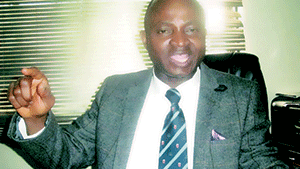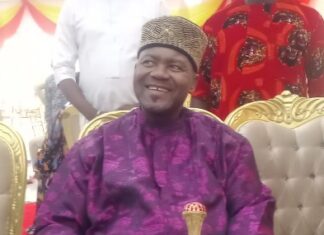Olu Daramola, a Senior Advocate of Nigeria (SAN) and Deputy Managing Partner in the law firm of Afe Babalola, was called to the Bar in December 1993 after studying Law at the University of Lagos. He had studied Political Science at the University of Ibadan. In this interview with Senior Correspondent, ONYEWUCHI OJINNAKA, the lawyer who was elevated to the Inner Bar in December 2008, speaks on the legal battle over the fourth alteration of the 1999 Constitution, among other issues.
The fourth alteration of the 1999 Constitution became an issue of litigation between the former President Goodluck Jonathan and the National Assembly, to the extent that the former withheld his assent and dragged the latter to the Supreme Court to prevent it from overriding his veto, what is your position on this?
It is clear from the Constitution that power is shared by the three arms of government. It is not open to debate that the president has veto power and that the National Assembly can override the veto.
The law-making process involves the National Assembly passing a bill. The bill is forwarded to the president for his assent, so that it can become law. The president may decide to veto the bill, but the National Assembly can override the veto and pass the bill into law without presidential assent. To me, it is not an issue that should have been taken to court in the first place. It is not proper for the government to go to court to seek to prevent the National Assembly from exercising a power given to it by the Constitution. But since the matter is in court, all we can do is to wait for the outcome.
Considering the amount of money expended on the constitution, and the Supreme Court now adjourned till June 18 when so many National Assembly members who passed the bill would have gone. Do you foresee a continuation of the legal battle by the new members?
You know there is continuity in government. The mere fact that the past government handed over to a new government on May 29 will not affect the case. The new president and the new National Assembly will inherit the case. The new president may decide to press on with the case or withdraw it.
One of the contentious issues in the fourth alteration of the same 1999 Constitution is the separation of the offices of Attorney-General and the Minister and Commissioner for Justice, which the former president frowned at. Do you agree to the separation and who in your own view should be the number one law officer at federal and state level?
To me, separating the office of the Minister of Justice from that of the Attorney General will not change anything. It does not make any of them to be more effective. On the contrary, rivalry can develop between the two officers as to their respective functions and powers. What is important is to appoint a credible lawyer as the Minister of Justice and Attorney General. If we have two people who are not credible occupying the two offices, I do not see how they can make any difference. Meanwhile, the country would be saddled with maintaining the two of them when no effective service is being rendered. The problem with us in this country is that we run away from addressing the real issues. We look for ways to avoid confronting a problem head-long. For instance, many people, without thinking, will tell you that it is the immunity clause that is responsible for the pervasive corruption in Nigeria.
This is a laughable proposition. If immunity clause is responsible for corruption, how may ex-governors have been jailed or effectively tried since they left office? Mind you, the only persons who are entitled to immunity from prosecution under the constitution are the president, vice president, governor and deputy governor. None of them signs government cheques. If a governor perpetrates fraud through his commissioners and accountant-general, why are the law enforcement agencies not going after the officers? After all, they are not covered by the immunity granted to the governors. The immunity granted to the governor is only for the period when he is in the office and there is no limitation of time in prosecution of crime. Separating the offices of the Minister of Justice from that of the Attorney-General will only lead to duplication of offices which create more financial burden for the government. It is not the way to go with our dwindling resources. It is high time we began to merge some offices to reduce cost of governance.
What measures should the government adopt to address corruption in the country?
The main reason the electorate voted massively for (Muhammdu) Buhari was because he was seen as a man of integrity who would deploy all necessary arsenals to fight corruption and restore the integrity of the country. He cannot afford not to deliver on the promise. Happily, he has an eminent lawyer who is well respected for his integrity as a deputy. The war against corruption must be fought centrally from the presidency to the local governments. There are many states where no single official has been prosecuted since 1999. Does that mean we do not have corrupt people in the states? The anti-corruption agencies must scrutinise budget implementation at all levels of government to see areas where contracts are inflated or not executed at all.
Several means have been devised to steal public funds and make stealing look legitimate. Many government officials use companies where they have interests to perform the very tasks they were elected to perform.
Security vote is another means through which public officials steal public funds. As a first step, all public officials must be made to do open declaration of assets. Jonathan lost the moral battle against corruption when he refused to follow his predecessor in declaring his assets publicly. Many states made laws where they awarded jumbo terminal benefits for some selected officials which include annual overseas medical check-up and treatments. This is another area of corruption because such laws guarantee a permanent life of obscene luxury for political office-holders, while the people continue to wallow in misery and poverty. What is the morality of allowing a president or a governor who cannot build functional hospitals for his people the privilege of overseas treatment, even when he has left office? I have never heard that the president of America, the chancellor of Germany or British Prime Minister travelled to another country for medical treatment; but here, Nigerian public officials take it as a pride and status symbol. To sustain the confidence of the Nigerian people, the new government must depart from the ungodly and sadistic trend of spending the bulk of the nation’s resources only to secure comfort for the tiny minority of politicians in public office.
President Buhari must resist pressure to use political appointments to compensate those who worked for his success at the polls. He must appoint credible persons who can help him lift Nigeria to the first world. This is his chance and he must utilise it, so that history can remember him for good. With the resources we have in this country, there is no basis for mass poverty and suffering. He must ensure that only those who want to serve are in government, and not the political merchants who have held the country down by their greed and callousness.
The cost of running government must be reduced drastically to discourage profiteers from seeking public office. There is no reason a senator should earn more than a professor in a university. It is only in Nigeria that all categories of political office-holders can be clamouring for life pension. If his anti-corruption crusade succeeds, he will have enough money to provide infrastructure across the country. In fact, his economic and political programmes will only succeed to the extent of his success in the anti-corruption crusade. For me, he has started well by refusing to be drawn into the controversy of selecting or nominating leaders of the National Assembly. It is not the business of the president to nominate or even advise the National Assembly members on who should be their leader. The due process office must work to prevent fraud in the conduct of government business and not function as a clearing house of corruption. He must devise a way of watching the watchers. The anti-corruption officials must be strictly monitored in the discharge of their duties and must not be allowed to operate as loose cannons. The cleaning exercise must start with the law enforcement agencies, else no tangible result will be achieved.














